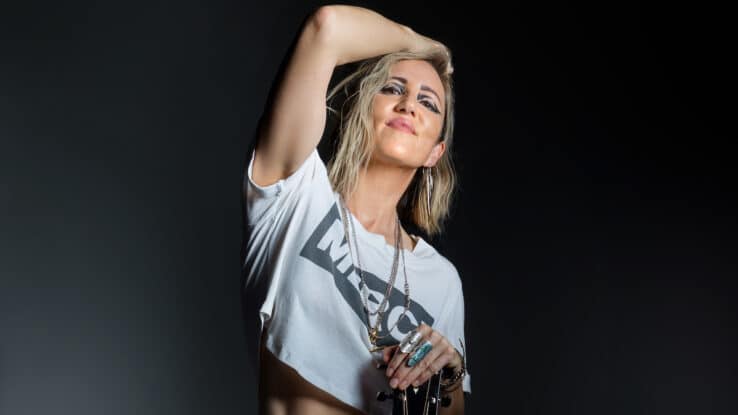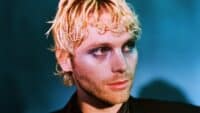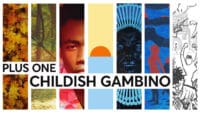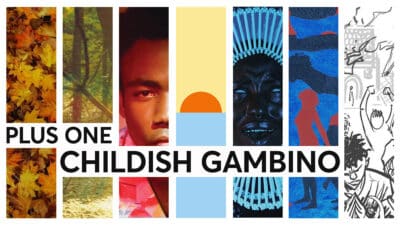Interview

Showstoppers
KT Tunstall on the story behind ‘Suddenly I See’
The Scottish singer-songwriter kicks off our Showstoppers series with a deep dive into her mega hit
Photo by Cortney Armitage
“I just don’t think any of us knew that a 30-year-old folk singer from Scotland with a guitar was gonna have a massive smash,” says KT Tunstall. “On paper, it was really unlikely.”
She’s speaking from Razorlight drummer Andy Burrows’ spare bedroom – he’s drumming on her tour – jet-lagged but full of enthusiasm for a song she still isn’t tired of talking about. On paper, as she says, ‘Suddenly I See’ didn’t seem like an obvious chart topper. Tunstall was a relative unknown when the song was released, a busker who’d been trying to make it independently in the industry for 15 years.
“I didn’t really want to sign a record deal,” she says. “I really wanted to stay independent and do everything without having to sign any contract.” But at 29, she finally signed what she describes as “a tiny little record deal” with British label Relentless and started work on her debut album, Eye To The Telescope. An early career spot on Later… With Jools Holland and a buzzy lead single with ‘Black Horse And The Cherry Tree’ garnered industry attention, but her biggest hit was still to come, helped along by none other than Meryl Streep.
“Basically,” says Tunstall, “they made me a music video starring Meryl Streep and Anne Hathaway.” She’s speaking about The Devil Wears Prada, the international hit film about an overbearing magazine editor (Streep) and an aspiring young journalist (Hathaway). The fashion world isn’t Tunstall’s natural habitat. She relates her bemusement at being asked to do a ten-page fashion spread in Rolling Stone Japan when she’d “only ever bought clothes from charity shops”. But anyone who’s seen the film will immediately recall its opening sequence: a slightly tongue-in-cheek supercut of New York’s best-dressed woman, set to the entirety of ‘Suddenly I See’.
When the film was released, Tunstall was on tour in America. She and her band piled into the first cinema they could find. “We were all just like, oh, my God, it’s the whole song. And at the end of the song we all stood up and cheered. There were about six other people in the theatre, and they were like, ‘What is wrong with them? They must be very excited about this film.’” She’d known very little about how the track would be used going in – certainly not that it would be “the whole song, no edits, and no dialogue over the song. I remember my manager saying to me at the time, “Enjoy this, because it never happens.”
“It was also really cool seeing how the lyrics could just be used for whatever you wanted to use them for… I don’t usually write songs that have that big general theme to them. I was just so glad that I’d written it.”
Of all Tunstall’s songs, to hear ‘Suddenly I See’ blaring out of the cinema speakers was perhaps the most satisfying. “This is what record labels do,” she explains, “they sometimes just say this awful thing where they’re like, “We haven’t got enough hits,” or something. God, it just makes you want to barf, you know, that you’ve just got to somehow magically go home and come up with hits. And the really annoying thing is that most people actually do.”
Tunstall was 30 at this point, although most people assumed she was younger, because of her “chubby cheeks,” she thinks. Finally giving in and signing a deal was supposed to get things moving, and now she’d found herself at another road block. Deflated, sat in her overpriced basement flat in Gospel Oak, she turned to Patti Smith for comfort. On went Horses and, as she listened, Tunstall found herself staring at the album cover.
“It’s an amazing picture,” she says. “Because my album was about to come out, I’d gone through some of my first photo shoot experiences and press experiences. I was realising how difficult it is to capture who you are in a photograph and how you feel as a normal person, and not just as a weird, posing version of yourself. And this photograph is so brilliant. It’s, of course, by the genius Robert Mapplethorpe. They were very, very close – they were intimate, they were lovers, they were friends – and I think because of that, she’s not looking at the camera. She’s looking at him. And so the camera’s just kind of inconsequential, because it’s two friends looking at each other. And he caught this picture of her where she’s just completely androgynous, totally relaxed, and she’s got this quite defiant look about her where she’s like, ‘Well, this is me – who are you?'”

“I felt that question on me, looking at this photograph. And I had this kind of realisation. I’d been trying really hard to persuade other people that I was good, and trying to get people to come to gigs and trying to get people to listen to my music. And I was looking at this picture, and I was just like, she’s just being. She’s just simply being herself, and it’s enough. And I was like, that’s what I want to be. I just want to be being. I want to stop having to try.
“I must have written the song in less than 40 minutes. It came out like a memory.”
Tunstall brought the song to producer Steve Osborne, someone she trusted to deliver a radio hit that still sounded like her. “That’s a game changer, having someone really get to know you to the point where they’re like, ‘This is what sounds like you. Someone banging sticks on metal and you just playing guitar.’”
“We really had very little money,” she remembers. “Steve was working in Peter Gabriel’s studio Real World, which is super fancy. We couldn’t afford that. We ended up going into this place called Nam, which was the initials of an old roadie who’d had an accident and was in a wheelchair. He ended up living with his mum and he basically turned his mum’s house in Bradford-on-Avon into a studio. The vocal booth was his disability ramp, so I could either sing going upwards or going downwards. It was mental – we were sellotaping duvets on the wall and stuff – but it was brilliant. It was exactly how it should have been.”
The small – and larger – inconveniences of the unconventional recording space didn’t bother her. “I don’t particularly like being in massive fancy studios where you’ve got everything you need. I quite like having to think on our feet and going well, how do we get that sound? What can we do? Are there any pots and pans anywhere? Why don’t we just get a cardboard box? You end up with much more interesting sounds when you give yourself a little bit of pressure and a bit of limitation in terms of what you’ve got to work with.”
I reference the scrappiness of the track’s sound, that ‘I’ll do it myself, then’ feel that young women in particular still relate to. Tunstall is delighted.
“That’s the word!” she exclaims. “You’ve nailed me. If anyone says describe yourself in one word, I’m like, ‘scrappy’. I’ve never been a perfectionist. And I think that the imperfection is where the connection is, you know? You’re just another girl in a pair of boots walking down the street. And I love that about it.”
She also loves being the song’s only writer. “Now that we’re in the age of 25 people writing a song – which whatever, I mean, a song is a song, and you get there how you get there, so I don’t mean to be too judgmental. But in terms of it being this real female anthem, it was so satisfying that I wrote it on my own. Especially when I won all these awards for it. You know, there’d be five guys going up on stage to get the award before and then just me on my own going, “Thanks very much.” There was something that really tied in with the song – that great sense of self sufficiency.”
Tunstall was at the Grammys recently. In characteristic fashion, she left one of the parties in favour of a dive bar over the road, where she describes meeting three girls in their early 20s with temporary tattoos all over their faces. “One goes into her bumbag, and she’s like, “You can choose from two temporary tattoos, which one do you want?” And I was like, “I’ll have the anchor, please.” So she’s, like, putting temporary tattoos on all of us. And then it turns out that they all bought loop pedals and guitars because of ‘Black Horse’ and ‘Suddenly I See’.” She pauses. “It’s so crazy to me, because they were babies when the song came out, but they’ve grown up with it.”
I tell her that I remember singing ‘Suddenly I See’ in a girls choir in school. She laughs.
“That’s one of the things that’s brought me the most joy over the years with ‘Suddenly I See’, is that it’s such a girl’s anthem. I grew up in the 80s, and so I grew up with Madonna and Whitney Houston and amazing artists. But they were sort of on a pedestal and kind of untouchable, like Beyoncé and Rihanna are now, you know, like you’re the minions kind of worshipping and they’re the queen on the stage.
“I think with ‘Suddenly I See’, it introduced me to the world in such a friendly way, like on a level with other women. It feels a bit different now, but back then, there was this strange rub and friction, where women wouldn’t always necessarily be super into other women artists. It just felt like it cut through all the bullshit, and we were all mates. We were just this big sisterhood. It was just like a sleepover tune, you know? I love that about it.”
The song’s fanbase is far from female-only, though. “My favourite thing playing it live,” she says, “is that almost every gig there’s a pocket of young guys who’ve come and they just f*cking love this song. It’s just so funny. It’ll be like, two 19-year-old guys just having a really deep bro moment of dancing together and singing to ‘Suddenly I See’.”
That’s the beauty of a song like this one – that it can be just as pertinent to a New York fashion journalist as it can to two British teenage boys.
“If it came out now, I don’t know if it would still do well,” says Tunstall. “I’d love to think that it would.” She’s aware of what a window she found with the track, how she was able to ride the first wave of interest in female indie voices following Kings Of Leon, LCD Soundsystem and The Killers. “It was Norah Jones really that kind of opened the door for all of us girls playing instruments,” she acknowledges. “But it felt when it came out like it sounded really fresh, like it was just really real compared to quite produced stuff.”
I ask when she realised the track wasn’t just a hit of the moment, but that it was sticking around, to be discovered by teenagers who weren’t even born when it was released. “Do you know what I think it is?” she says. “Probably that it kept getting played in shops. Whenever I would go into garage or a chemist – everywhere, everywhere all over the world. I would go in somewhere to buy, you know, makeup wipes, and I’d be like, “Bloody hell, it’s playing again.””
“I have to say, when I hear it, if I’m in a Boots and it comes on, it still sounds wicked. It still sounds like its own thing.”
KT Tunstall is touring the UK this February and March – buy tickets here









